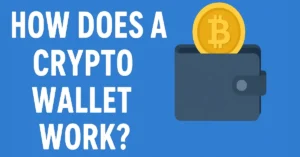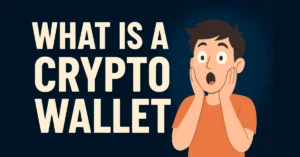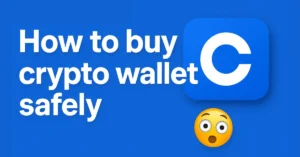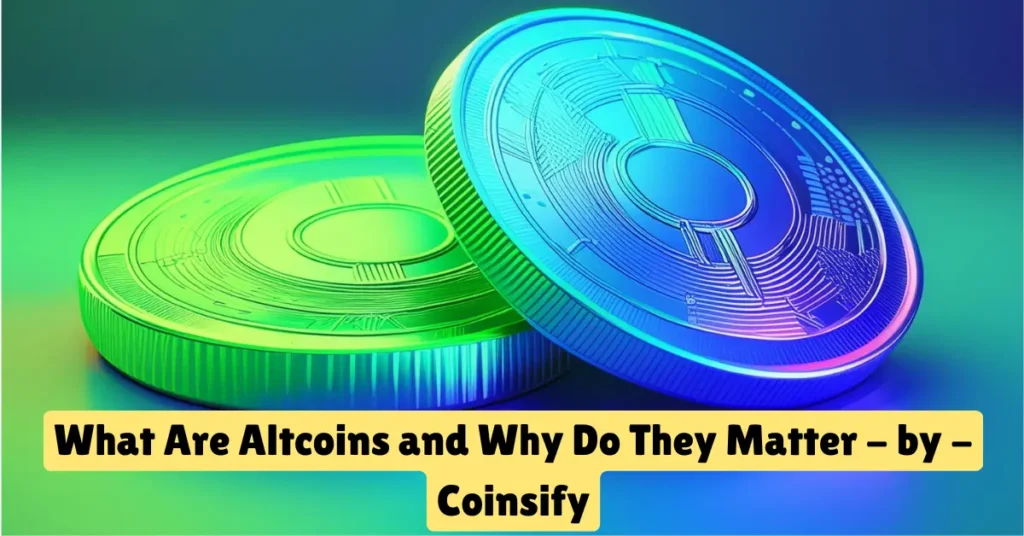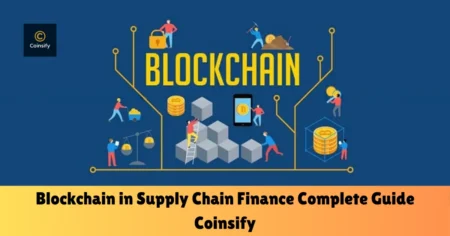What Are Altcoins and Why Do They Matter?
Introduction
Cryptocurrency is one of the most talked-about topics in the world of finance and technology today. Most people are familiar with Bitcoin, but it’s not the only digital currency out there. There are thousands of other cryptocurrencies, and these are called altcoins.
So, what are altcoins? Why were they created? And do they matter in the big picture of crypto?
In this blog, we’ll explain everything in plain English — no technical jargon, just easy-to-understand information to help you learn what altcoins are and why they’re important in the growing world of digital money.
Understanding the Basics: What Are Altcoins?

The term “altcoin” is short for “alternative coin.” It refers to any cryptocurrency that is not Bitcoin. Since Bitcoin was the first cryptocurrency and remains the most popular, all the other digital coins that came after it are called altcoins.
Altcoins are built using blockchain technology, just like Bitcoin, but many of them are designed to do different things. Some altcoins aim to improve on Bitcoin’s speed or reduce its energy use. Others offer new features like smart contracts, privacy options, or support for decentralized apps.
There are thousands of altcoins in the market today. Some of the most well-known include:
- Ethereum (ETH) – Known for smart contracts and decentralized apps
- Litecoin (LTC) – Created for faster and cheaper transactions
- Ripple (XRP) – Used mainly for fast international payments
- Cardano (ADA) – Focused on sustainability and scalability
- Solana (SOL) – Known for high-speed and low-cost transactions
Each altcoin has its purpose, strengths, and community behind it. Understanding what makes them different helps investors and users make better choices in the world of cryptocurrency.
Why Were Altcoins Created?
While Bitcoin was the first cryptocurrency and introduced the idea of digital money, it’s not perfect. As more people started using blockchain technology, developers saw opportunities to create better or more specialized versions of it. That’s where altcoins come in.
Altcoins were created to solve problems or add features that Bitcoin doesn’t offer. Here are some of the main reasons why altcoins were developed:
To Improve Speed and Efficiency
- Bitcoin transactions can be slow and expensive, especially when the network is busy. Many altcoins were designed to process transactions faster and with lower fees.
To Add New Features
- Some altcoins offer functions that Bitcoin doesn’t have, such as smart contracts (used by Ethereum), which allow programs to run automatically when certain conditions are met.
To Reduce Energy Use
- Bitcoin mining uses a lot of electricity. Some altcoins use different methods (like Proof of Stake) that are more energy-efficient and eco-friendly.
To Serve Different Purposes
- While Bitcoin is mainly seen as digital gold (a store of value), altcoins serve many different roles. Some are built for privacy (like Monero), others for quick payments (like Dash), and some for powering decentralized apps (like Ethereum and Solana).
To Create More Choice and Competition
- More altcoins mean more options for users and investors. They also encourage innovation and competition in the crypto world, which helps the whole industry grow.
Altcoins are not just “copies” of Bitcoin — they are often completely different in design and purpose. Their creation has helped expand what cryptocurrency and blockchain technology can do.
Types of Altcoins
Altcoins come in many forms, and each type is designed to serve a specific purpose. Understanding the different categories can help you better navigate the crypto world and make smarter choices as an investor or user.
Here are the main types of altcoins:
Stablecoins
These altcoins are designed to keep their value stable by being linked to real-world assets, like the US dollar or gold.
- Purpose: To avoid big price changes (volatility)
- Examples: USDT (Tether), USDC, DAI
- Use Case: Great for saving, transferring money, or trading without worrying about sudden price drops.
Utility Tokens
These are coins used inside a specific blockchain platform or project to access certain services or features.
- Purpose: To use within a product or platform
- Examples: Chainlink (LINK), Filecoin (FIL)
- Use Case: Powering apps, accessing data services, storage, etc.
Security Tokens
These represent real-world assets like stocks, real estate, or bonds on the blockchain. They are usually regulated and treated like traditional investments.
- Purpose: To offer ownership or profit-sharing
- Examples: Synthetix (SNX), tZERO
- Use Case: Investing in digital shares or assets with legal backing
Governance Tokens
These tokens give holders the power to vote on decisions in a blockchain project, like upgrades or rules.
- Purpose: To give users control over the future of a project
- Examples: Uniswap (UNI), Aave (AAVE), Compound (COMP)
- Use Case: Voting on changes, influencing project development
Meme Coins
Started mostly as jokes or internet memes, these coins have gained popularity due to strong online communities.
- Purpose: Originally for fun, but now used in real communities
- Examples: Dogecoin (DOGE), Shiba Inu (SHIB)
- Use Case: Tipping, fundraising, or just having fun in the crypto space
Each type of altcoin has its role in the crypto ecosystem. Some focus on being useful, others on providing stability, or giving people a voice. Knowing these types can help you decide which coins align with your goals.
Why Altcoins Matter
Altcoins are more than just alternatives to Bitcoin — they are a major part of the cryptocurrency world and are driving much of the innovation in this space. Here’s why altcoins truly matter:
They Encourage Innovation
- Altcoins introduce new technologies, ideas, and features that go beyond what Bitcoin offers. For example, Ethereum brought smart contracts, Solana focuses on speed, and Cardano aims for sustainability. These advancements push the entire industry forward.
They Offer More Investment Options
- Bitcoin is expensive and may not fit every investor’s budget or goals. Altcoins provide a wider range of prices and use cases, giving people more choices to diversify their crypto portfolio.
They Support Decentralized Apps (DApps)
- Many altcoins power decentralized applications, which are used in areas like finance, gaming, social media, and more. These DApps run on blockchains like Ethereum, Solana, and Polygon, and offer real-world utility.
They Improve Speed and Lower Costs
- Some altcoins are designed to handle transactions faster and cheaper than Bitcoin. For example, Litecoin and Dash are built for quick payments, making them more practical for everyday use.
They Create a More Decentralized Ecosystem
- The more altcoins we have, the less control any single project or group has over the crypto space. This supports the core goal of blockchain: a fair and open system without a central authority.
They Tackle Specific Problems
- Altcoins are often created with a purpose in mind. Some focus on privacy (like Monero), others on energy efficiency, and some on cross-border payments. This variety helps solve real-world problems using blockchain technology.
In short, altcoins matter because they bring diversity, innovation, and flexibility to the crypto market. Without them, the world of cryptocurrency would be far less dynamic and useful.
Risks and Considerations

While altcoins offer many benefits and opportunities, they also come with risks that every user or investor should be aware of. The crypto market is still young and constantly changing, so it’s important to stay informed before making any decisions.
Here are some key risks and things to consider:
High Volatility
- Altcoin prices can rise or fall very quickly. A coin might gain huge value one day and lose it the next. This makes investing in altcoins risky, especially for beginners.
Lack of Regulation
- Most altcoins operate in a space with little to no government regulation. This means there’s less protection for users if something goes wrong, like a scam or hack.
Scams and Fake Projects
- Unfortunately, the crypto world has seen many fraudulent altcoin projects that make big promises but disappear with people’s money. Always research a project before investing and avoid coins with no real use or team behind them.
Technology Risks
- Some altcoins are built on weak or untested technology. Bugs, security flaws, or failed updates can lead to loss of funds or damage to the project’s reputation.
Short Lifespan of Many Coins
- Not all altcoins survive in the long run. Many get abandoned due to a lack of interest, poor development, or stronger competition. Some coins may simply fade away over time.
Liquidity Issues
- Smaller or newer altcoins may not be easy to buy or sell. If there aren’t enough buyers and sellers, you could struggle to trade your coins or get a fair price.
Market Hype and Speculation
- Many altcoins rise in popularity due to hype rather than real value. Following trends without understanding the project can lead to emotional decisions and financial losses.
What You Can Do
To protect yourself:
- Do your research (DYOR)
- Check the project’s website, team, use case, and community
- Avoid investing more than you can afford to lose
- Use trusted exchanges and wallets
Being aware of the risks helps you make smarter, safer choices in the world of altcoins.
The Future of Altcoins
Altcoins have already come a long way since the launch of Bitcoin. From basic digital coins to advanced blockchain platforms, they continue to grow and shape the future of technology and finance. But what does the future hold for altcoins?
Let’s take a look at where things might be heading:
More Real-World Use Cases
- Altcoins are expected to become more useful in everyday life. We’ll likely see more projects being used for things like online payments, digital identity, gaming, healthcare, and even voting systems.
Growth of Decentralized Finance (DeFi)
- Many altcoins power DeFi platforms — systems that let people borrow, lend, and earn interest without using a bank. As DeFi grows, altcoins like Ethereum, Avalanche, and Solana will play an even bigger role.
Wider Adoption by Businesses and Governments
- Some companies are already accepting altcoins for payments. In the future, we may see governments and large institutions getting more involved, either by using altcoin technology or creating their blockchain-based solutions.
Better Regulations
- As crypto becomes more mainstream, clearer regulations will likely be introduced. While some see this as a risk, good regulation could help protect users and attract more serious investors to the altcoin market.
Improved Technology and Sustainability
- Many altcoins are focusing on being faster, cheaper, and more energy-efficient. For example, Ethereum moved to a more eco-friendly system (Proof of Stake), and others are following similar paths. This will make altcoins more sustainable in the long term.
Continued Innovation and Competition
- The crypto space is full of creativity. New altcoins will keep launching with fresh ideas, pushing the boundaries of what’s possible with blockchain. This competition drives improvement across the whole industry.
A Final Thought
Altcoins are more than just digital tokens — they represent a new wave of innovation. While not all will succeed, many will continue to grow and shape the future of how we use technology, manage money, and interact online.
Advantages and Disadvantages of Altcoins
Like any financial or technological tool, altcoins have their strengths and weaknesses. Knowing both sides can help you make better decisions, whether you’re investing, trading, or just exploring the world of cryptocurrency.
✅ Advantages of Altcoins
| Growing Community and Ecosystems Popular altcoins often have strong communities and developer support, which helps keep the projects active and improving. |
| Lower Transaction Fees Compared to Bitcoin, many altcoins provide cheaper and quicker transactions, which is useful for day-to-day use. |
| Diverse Investment Options Altcoins give investors a wide variety of choices, each with different goals, technologies, and potential returns. |
| Specialized Use Cases Some altcoins are created for specific industries — like gaming, file storage, or healthcare — giving them real-world value. |
| Support for Decentralized Apps (DApps) Altcoins like Ethereum and Solana power ecosystems for building decentralized apps, opening up new business and tech opportunities. |
| Growing Community and Ecosystems Popular altcoins often have strong communities and developer support, which help keep the projects active and improving. |
❌ Disadvantages of Altcoins
| High Volatility Altcoin prices can change very quickly. This makes them risky for short-term investors or those new to crypto. |
| Lack of Regulation With little government oversight, altcoins can be more vulnerable to scams, hacks, and sudden shutdowns. |
| Scams and Fake Projects The altcoin market has seen many fraudulent or low-quality coins, which exist only to take advantage of hype. |
| Low Adoption Rates Many altcoins struggle to gain real-world use or popularity, which limits their long-term value. |
| Technical Challenges Some altcoins face bugs, poor code, or scalability issues that can hurt performance or user experience. |
| Short Lifespan A large number of altcoins fail or get abandoned within a few years due to weak ideas, lack of funding, or market competition. |
Summary
| Advantages | Disadvantages |
| Innovative features | High price volatility |
| Lower fees | Less regulation |
| Investment variety | Risk of scams |
| Real-world use cases | Limited adoption |
| Supports DApps | Technical issues |
| Strong communities | Many coins don’t survive |
Altcoins have great potential, but they also carry risks. Always research before investing, and never put in more than you can afford to lose.
FAQs
What exactly is an altcoin?
An altcoin is any cryptocurrency that is not Bitcoin. Thousands exist, each offering different features, goals, or technologies.
How are altcoins different from Bitcoin?
While Bitcoin mainly acts as digital gold (a store of value), many altcoins focus on other goals, such as smart contracts, faster payments, lower fees, or extra privacy.
Are altcoins safe to invest in?
Safety depends on the project’s quality, security, and community. Some altcoins are well-established and trustworthy; others are risky or even fraudulent. Always research before investing and never spend more than you can afford to lose.
How can I buy altcoins?
Most people buy altcoins on cryptocurrency exchanges (e.g., Binance, Coinbase, Kraken). You sign up, deposit money (or Bitcoin), and then trade for the altcoin you want. Make sure the exchange is reputable and supports your local regulations.
Where do I store my altcoins?
You can keep altcoins in:
Exchange wallets (convenient but less secure)
Software wallets on your phone or computer
Hardware wallets (USB-style devices) for maximum security
What is the best altcoin to invest in?
There is no single “best” altcoin. The right choice depends on your goals, risk tolerance, and research. Look at factors like the project’s use case, team, roadmap, and community support.
Can altcoins make me rich quickly?
Some altcoins have delivered huge returns, but many others have failed. Price swings are extreme, so treat altcoins as high-risk investments and avoid chasing quick profits.
How are altcoins used in DeFi?
Decentralized Finance (DeFi) platforms run mainly on altcoins such as Ethereum, Solana, and Avalanche. These altcoins power lending, borrowing, trading, and earning interest, without traditional banks.
Are altcoin transactions anonymous?
Most altcoins are pseudonymous, not fully anonymous. Special privacy-focused coins (like Monero and Zcash) hide more details, but laws in many countries still apply.
How will altcoins be taxed?
In many regions, profits from buying or trading altcoins are subject to capital-gains tax, just like stocks. Tax rules vary by country, so check local regulations or talk to a tax professional.
Do altcoins have a future?
Yes—many developers, companies, and users continue to build and adopt altcoin projects. That said, not every altcoin will survive. Focus on coins with strong technology, real-world use, and active communities.
How do I avoid altcoin scams?
Research the team and the white paper
Check community channels (Reddit, Twitter, Discord)
Look for audits or security reviews
Be cautious of promises of guaranteed profits or “too-good-to-be-true” returns
Conclusion
Altcoins play an important role in the world of cryptocurrency. They bring new ideas, better technology, and more choices beyond Bitcoin. While they offer exciting opportunities, altcoins also come with risks, so it’s important to learn and research before getting involved. Whether you want to invest, use, or understand crypto better, knowing about altcoins helps you stay informed in this fast-changing digital world.
Bonus Points About Altcoins
Altcoins Can Be Used for Micropayments
- Because many altcoins have low fees and fast transactions, they are great for small payments like buying digital content or tipping online creators.
Some Altcoins Focus on Privacy
- Coins like Monero and Zcash offer extra privacy features that keep transactions more anonymous than Bitcoin.
Altcoins Help Build a Decentralized Internet
- Projects like Ethereum and Polkadot are working toward creating a decentralized web where users control their data.
Altcoins Enable Tokenization of Assets
- With altcoins, real-world assets like art, real estate, or stocks can be turned into digital tokens and traded easily.
Community Support Is Key for Altcoin Success
- A strong and active community often helps an altcoin grow and improve faster.
Altcoins Can Support Charity and Social Causes
- Some altcoin projects use blockchain transparency to focus on donations, social good, or funding important causes.
Watch for Network Upgrades
- Many altcoins regularly update their technology to stay competitive and solve problems, so staying informed is important.
Also read
- What is a Crypto Wallet and How Does It Work? – Coinsify
- 10 Crypto Terms Every Beginner Must Know – Coinsify
- What is Blockchain Technology – Complete Guide – Coinsify
- How to Buy Crypto Safely in 2025 – Complete Guide – Coinsify
- Bitcoin vs Ethereum: Key Differences Explained – Complete Guide
- Ultimate Blockchain Glossary: Learn Blockchain Terms Easily
- How to Buy Bitcoin Safely (Complete Beginner’s Guide)
- Top 10 Crypto Wallets for Beginners (2025 Edition)
- What is Cryptocurrency? A Beginner-Friendly Guide (2025)
